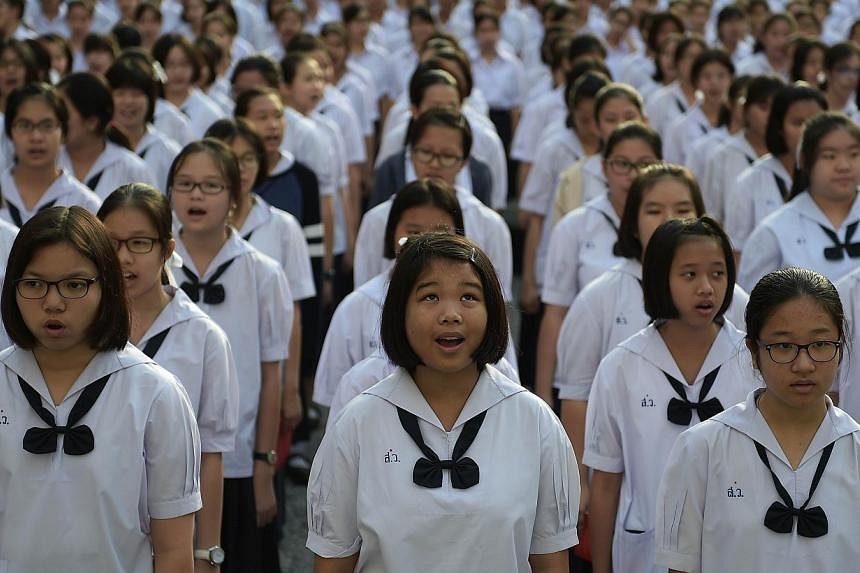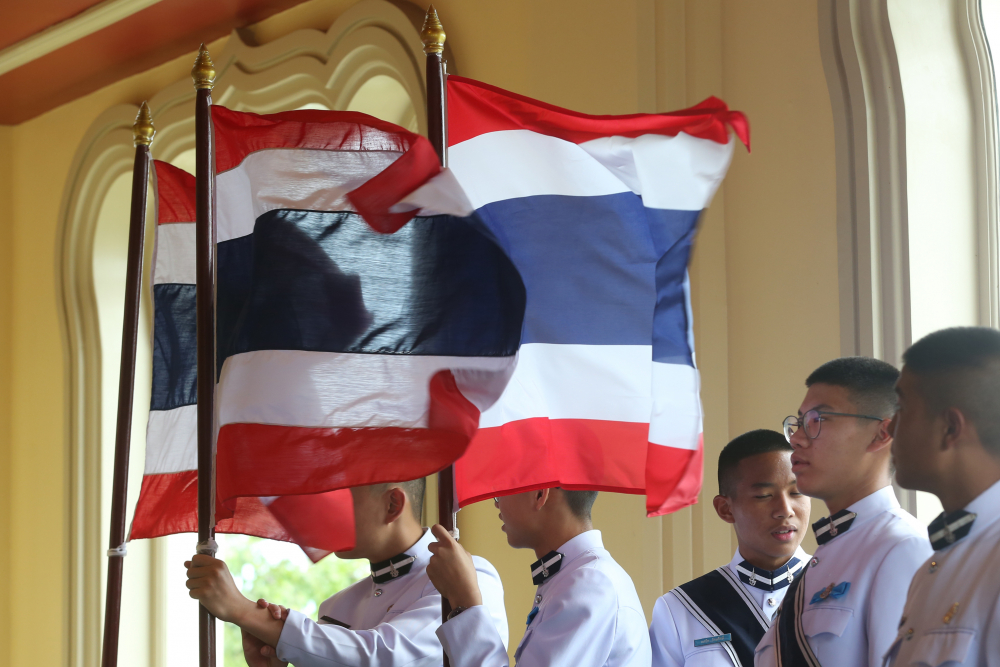About 6.5 million student in Thailand from kindergarten to high school will soon be getting lessons in Thai nationalism, patriotism and love of the monarchy via four key government ministries.
Led by Interior Minister Anutin Charnvirakul, a memo of understanding (MoU) was signed last month by his ministry and the ministries of Education; Higher Education, Science, Research; and Labor to add the country’s so-called three pillars – nation, religion and king – to its human-resource development agenda.
“Indicators of people’s quality should extend beyond their ability, career performance or income-generation potential to good health, ethics, love for the country, pride in the nation and loyalty to the country’s core institutions,” Anutin said.
It was necessary to ensure the public receives information that makes them proud of their country, culture and monarchy, which have been key pillars of the kingdom from the beginning, he added.
“When people can’t connect with their roots, violence and conflict happen,” said Anutin, who is also a deputy prime minister and leader of the Bhumjaithai Party.

The 12 Thai values
Observers point out that as soon as a new government comes to power, patriotism, royalism and nationalistic history feature prominently in teaching at schools.
After the 2014 coup, the National Council for Peace and Order (NCPO) issued schools with “12 Thai values” – including love for the nation, religion and monarchy – to be taught as the main focus of Social Studies classes.
When coup leader General Prayut Chan-o-cha became prime minister again after the 2019 election, his administration decided to separate history from social studies to ensure it had a stronger impact.
Based on the 2008 core curriculum designed under the advice of Her Majesty Queen Sirikit, history was made a major subject in schools.
Social Studies as taught in Thai schools contains about 420 learning indicators, with 82 concerning history and others covering religion (136 learning indicators), followed by civic education (72), geography (68) and economics (62). Learning indicators serve to assess children’s learning at different points in time.
“Politicians preach about history and civic education to further their political standing,” said Tanawat Suwannapan, who teaches Social Studies at a state-run school in Bangkok and manages the Krukorson page on Facebook.
He pointed out that half of the assessment standards for civic education are already about the love of nation, religion and king, while half of the indicators for economics concern HM King Bhumibol Adulyadej the Great’s sufficiency economy philosophy.
“If you look into the learning indicators for history, you find the subject is about nationalism and royalism,” he said.
Stithorn Thananitichot, who heads the Office of Innovation for Democracy at King Prajadhipok’s Institute, believes Bhumjaithai pushed for the MoU because it wants to position itself as royalist.
“If Palang Pracharath and the United Thai Nation parties are described as blue or royalist, then Bhumjaithai wants to be the dark-blue party,” he continued.
Stithorn predicts that the move will ensure Bhumjaithai wins the hearts of conservative voters who are worried about the young generation’s push for democracy. Many students have been openly calling for monarchy reform in recent years.

How will Thai children be shaped with patriotism?
Public schools under the Office of Basic Education Commission (OBEC) teach students to be proud of Thailand and loyal to the country’s main institutions, including the monarchy, said Thanu Wongjinda, secretary-general for the Office of Vocational Education Commission and OBEC’s acting secretary-general.
“OBEC’s policy for fiscal year 2024-2025 is for all schools to incorporate sufficiency economy activities in their curriculum,” he said.
He added that history, civic education, morality, and democracy would also be taught using modern methods.
Meanwhile, Anutin is seeking to extend his educational push to the civil service, where he wants all job applicants to be tested for patriotism and loyalty to the king.
However, Stithorn said efforts to inculcate love for nation, religion and monarchy are unlikely to have much impact on adults who have already formed strong beliefs.
“But they can shape the opinions and attitudes of young children for the future,” he said.
Tanawat said that as a state official, he has no choice but to support government policies. But in this case, he doubts the state will get what it hopes for. He points out that people – children included – can now access knowledge from many sources, not just their schools or employers.
If the government is successful in producing an intolerant “far-right” generation, social rifts will continue, he said.
“It’s not wrong to be either right or left, but we should not teach children to believe that if ‘A’ is good, then everything else is bad and should be eliminated,” he cautioned.

What is expected of the Thai people ?
In Tanawat’s opinion, the government wants to see the general population become submissive, obedient and loyal, while believing in the government’s ideas and upholding the values it promotes.
“When you control people’s beliefs, you can control their actions. But if Thais are taught not to ask questions, what’s the point in telling people to think outside the box, be creative and innovate?”
He said authorities should understand that their moves now will influence the quality of people Thailand produces in the future. So, they had better think carefully about what they truly expect from Thai citizens.
“What characteristics do you expect to see when hiring a Thai national?” he asked.
History on Thailand’s patriotism: a teacher’s perspective
Tanawat said history as a subject is not just about what happened in the past or the collective memory of people and societies. When children study history and patriotism, they learn how to process facts and think for themselves, he pointed out.
“History provides guidelines on how a person understands or proves something, argues or debates and reasons.”
When teaching history, Tanawat said he does not underline the need to love the nation or its pillars. The focus in his lessons is on social justice, democracy and the current situation.
“We study history to understand the present so we can look ahead and know what we truly want for the future,” he said.
This article was first published by Thai PBS






